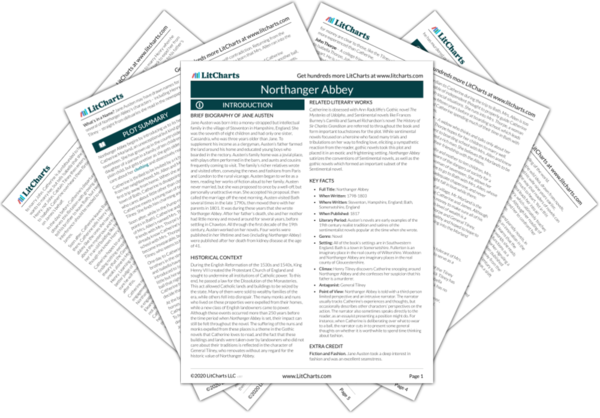Summary
Analysis
The next morning, Henry (Mr. Tilney), Eleanor (Miss Tilney), and Catherine take their country walk. Catherine comments that a cliff they see reminds her of the south of France. A bit surprised, Henry asks if she has been to France. Catherine explains that it reminds her of the cliffs described in the Mysteries of Udolpho, but says she presumes that he is above reading novels. Henry says that, quite to the contrary, he could not stop reading Udolpho and in fact read it all himself when he had promised to read it aloud to his sister. Henry gently mocks Catherine for saying Udolpho is the “nicest” book in the world, and Eleanor explains that he thinks “nice” to be an insufficiently precise adjective, but that he is very impertinent to correct Catherine just as he does her, his sister.
Once again, there is a sharp contrast between the sincere Henry Tilney and other characters who say hypocritical things to seem better than they are—like John Thorpe dismissing novels, despite obviously having enjoyed books by Ann Radcliffe. This scene also provides a sharp contrast to those in other novels in which the characters never admit to reading novels themselves. Here, Henry and Catherine both turn out to be avid readers of the same book. Their relationship has some basis in shared taste, which differs from the sudden experience of love (often between two people of very different backgrounds) usually portrayed in sentimental novels of the time.
Themes
Eleanor asks Catherine if she is fond of novels in general, and Catherine confesses that while she likes novels, poetry and plays, she finds histories very boring. Eleanor reveals that she likes histories, and Catherine says that she will no longer pity the writers of histories for writing books used to torture little children. Henry says that she is using the words “torment” as a synonym for “instruction,” and she says that if he had seen so many brothers and sisters struggling to learn to read, he might agree with her. He reminds her that she herself would not be able to read Udolpho if she had never learned to read, and she assents.
This conversation about books also contrasts with the ones Catherine has had with the Thorpes. While Isabella saw books as a token of her fashionableness and John saw them as a waste of time, Henry and Eleanor think of them as ways of learning more about the world and themselves. This approach is more sincere and unpretentious, whereas the Thorpes’ attitudes to books seem to be copied from someone they seek to emulate.
Themes
Literary Devices
Henry and Eleanor begin to discuss the landscape from the point of view of those who draw, and Catherine is ashamed not to be able to follow their conversation. She should not be ashamed, the Narrator adds, because there is nothing so charming in a young, good-looking woman to a clever young man as her knowing nothing and being ready to listen to him explain it. Henry explains the landscape to Catherine from an artist's perspective, and she pays such rapt attention that he concludes she has “great natural taste.”
Catherine does not realize that her sincere desire to learn makes her ignorance endearing (as the Narrator assumes that men enjoy explaining things to “ignorant” women). Although Catherine is unlike the well-educated and sophisticated Eleanor, by her readiness to learn from Henry, she shows a capacity to learn and grow to become a good judge of the world around her.
Themes
The topic turns to politics, about which Catherine has little to say. Changing the subject, she says she has heard from a friend that “something very shocking” will come out of London. Eleanor is alarmed, thinking that Catherine is still talking about current events, but Henry understands that Catherine is not predicting that there will be a riot, but instead anticipating the release of a new gothic novel. He explains them to one another and then Eleanor chides him for behaving as if he did not respect women’s intelligence. Catherine is unperturbed; she admires Henry just as much when he says things she does not understand as when he is comprehensible to her, and believes him to always be perfectly right.
Henry has a clear impression at this point of how limited Catherine’s awareness of the world is, but, contrary to what Eleanor suggests, he does not look down on Catherine for this. Instead, he is beginning to see himself as someone who can teach Catherine about topics, like current events, with which she has little familiarity. Although Catherine’s exposure to the world is mainly through novels, she clearly is curious to learn about whatever interests Henry, including drawing and politics.
Themes
Literary Devices
Get the entire Northanger Abbey LitChart as a printable PDF.

After their walk, the Tilneys accompany Catherine to her lodgings and ask Mrs. Allen’s permission to have Catherine to dinner the day after next. Catherine can barely hide how happy she is. Later in the day, Catherine runs into Isabella’s sister Anne. Anne tells Catherine that John drove her sister Maria and Isabella and James drove together. Anne says she would hate to have gone herself, but Catherine thinks Anne may be jealous of her sister for being chosen to go on the drive. Catherine hopes that the pleasure of the drive will mean that Isabella and James no longer resent her refusal to come with them.
Despite their insistence that Catherine come on the drive or else ruin it for everyone, Isabella and John found a way to still take the drive. Catherine, who has failed to see hypocrisy in many of Isabella’s actions, is beginning to pick up on some of the mean-spirited dynamics in the Thorpe family, and now suspects that Anne is not being forthright when she says she was glad not to have been invited.
Themes












